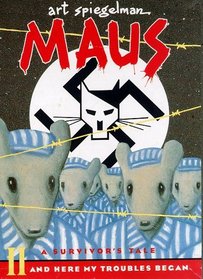Holly E. (Holl286) reviewed Maus: A Survivor's Tale: My Father Bleeds History / Here My Troubles Began on + 25 more book reviews
Helpful Score: 2
The author captures his father's memories of life before and during the Holocaust in a flashback story form. He also captures their current relationship and his father's sometimes bizzare quirks that his son dosen't know how to feel about.
Charlene J. (Bella963) reviewed Maus: A Survivor's Tale: My Father Bleeds History / Here My Troubles Began on + 36 more book reviews
Helpful Score: 1
My daughter had to read this book for her 8th grade summer reading. She LOVED it so much that we went out to get the 2nd part. Highly reccommend this boxed set with parts 1 and 2.
Helpful Score: 1
"Maus" is a Pulitzer-winning graphic novel of the Holocaust, written by the son of a survivor.
The novel tells the story of Vladek Spiegelman in the years leading up to WWII and the Holocaust. Interwoven with the story is the tale of the hero's twilight years, where he has become a bitter and difficult old man, and his son, Art, tries to bridge the gap between the two of them by trying to understand his father's experiences. The younger Spiegelman at times uses the narrative to offer commentary on the medium he's telling it in, and even expresses doubts as to whether the book adds anything of value to Holocaust literature.
To that, I'd have to add my own unequivocal "yes." Although "Maus" chronicles the same horror found in books like "Night" and movies like "Night and Holocaust," it also expresses something about the resilience of the human spirit. Vladek Spiegelman makes no claims that he and his wife survived the Holocaust because of any special merit on their part, but his story also shows a man who seized opportunity when he could, and not only kept himself alive but managed to give hope and assistance to other Jews during the darkest period of the 20th century.
And while Vladek's story conveys much misery and loss, it ends on the happy note of reunification, as he finds his wife after the war has ended, and the two are able to start a new family.
For all the horror and nightmare of the Holocaust and other periods where we give way to hatred and fear, and the other woes released from Pandora's box, "Maus" reminds us that hope also is at loose in the world, and cannot be extinguised even by the likes of Hitler and those who support them.
The novel tells the story of Vladek Spiegelman in the years leading up to WWII and the Holocaust. Interwoven with the story is the tale of the hero's twilight years, where he has become a bitter and difficult old man, and his son, Art, tries to bridge the gap between the two of them by trying to understand his father's experiences. The younger Spiegelman at times uses the narrative to offer commentary on the medium he's telling it in, and even expresses doubts as to whether the book adds anything of value to Holocaust literature.
To that, I'd have to add my own unequivocal "yes." Although "Maus" chronicles the same horror found in books like "Night" and movies like "Night and Holocaust," it also expresses something about the resilience of the human spirit. Vladek Spiegelman makes no claims that he and his wife survived the Holocaust because of any special merit on their part, but his story also shows a man who seized opportunity when he could, and not only kept himself alive but managed to give hope and assistance to other Jews during the darkest period of the 20th century.
And while Vladek's story conveys much misery and loss, it ends on the happy note of reunification, as he finds his wife after the war has ended, and the two are able to start a new family.
For all the horror and nightmare of the Holocaust and other periods where we give way to hatred and fear, and the other woes released from Pandora's box, "Maus" reminds us that hope also is at loose in the world, and cannot be extinguised even by the likes of Hitler and those who support them.
Helpful Score: 1
I lend this book to just about everyone who comes into my house. I've read and reread it and there is always some point in the story that will leave me misty eyed.
This is a narrative/pseudo-biography about Vladek Spiegelman's life during and after Auschwitz, and how his experiences have come to affect the lives of those around him. As you would expect with a graphic novel concerning the holocaust, a lot of parts are very graphic and unsettling.
The story is compelling, moving, and at times gut-retching. You would be doing yourself a disservice if you did not read this.
This is a narrative/pseudo-biography about Vladek Spiegelman's life during and after Auschwitz, and how his experiences have come to affect the lives of those around him. As you would expect with a graphic novel concerning the holocaust, a lot of parts are very graphic and unsettling.
The story is compelling, moving, and at times gut-retching. You would be doing yourself a disservice if you did not read this.
read for a class




